The near future, like tomorrow: An interview with Alex Rivera, director of Sleep Dealer
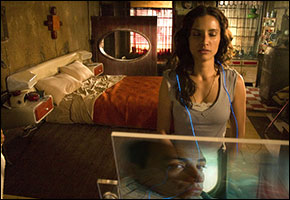
During an interview with Circle of Blue, director Alex Rivera discusses his recent film Sleep Dealer. He reflects on the impending future it predicts — a future of water privatization, virtual labor, and corporate surveillance. Science fiction, he believes, is a political genre that can be used to rethink not only resource extraction, but also free market capitalism.
Sleep Dealer is the winner of the Amnesty International Film Prize at the 2008 Berlin International Film Festival, as well as the Alfred P. Sloan Feature Film Prize and Waldo Salt Screenwriting Award at Sundance Film Festival in 2008. It was also nominated for the Grand Jury Prize at Sundance 2008. The film screened at the Grand Traverse Film Festival in July, 2008.
Can you introduce yourself to us and tell us a little bit about what you do and why you do it?
Alright. Well, my name is Alex Rivera. And I’m a filmmaker. I’ve been making films for about fifteen years. All of my films have, as a central thru-line, the question of immigration and the movement of people around the planet, which is transforming the places that people arrive to as well as the places they leave behind. That’s a sort of central connective tissue between all the films I do. The films vary in terms of tone and style. I’ve done some that are animation and are very playful. I’ve done some that are more serious documentaries that have been screened on PBS. And this last film is kind of a synthesis of a lot those, where it was meant to be a science fiction looking at questions of immigration, globalization in the near future — using a lot of the visual style and visual play of the genre of science fiction. But in its core it’s suppose to go at some real questions about the type of world we’re creating. One of the thru-lines in this future is the issue of the water crisis and impending water shortage and water privatization and water politics between North and South.
So that’s what I do. I try to make films that are substantial, that address living urgent political realities. But through a form and through a visual cinematic language that can hopefully bring those concerns to new audiences. I sometimes call the films Trojan horses: on the outside it looks like one thing; but inside it’s got these little ideological or analytical soldiers. So this film on the outside maybe looks like a Blade Runner or Minority Report. It looks like a playful science fiction, visually stylish; but inside it’s hopefully doing some real provocative work around the political question.
Who are your heroes, in the film world or otherwise. Who are some of your major influences?
Well, I come from a background of doing documentary and films that have existed more in the art world. I didn’t ever go to film school properly. I studied political science in college and documentary theory. So some of my early heroes were people like filmmaker Lourdes Portillo, who is a Chicano documentarian out of the Bay Area. Craig Baldwin who is a collage artist out of the Bay Area as well. Guillermo Gomez Pena, a performance artist. And then I do have people I look up to or people who inspire me in the world of feature film as well. Especially early work by Spike Lee, early work by Oliver Stone, Terry Gilliam, Kronenberg. I love going back. Films of Pontecorvo. I love Fritz Lang’s “Metropolis,” which is a huge inspiration for my film. So my inspirations are pretty diverse, but the people who have had the biggest impact on me are my friends and colleagues in the art world and in the world of documentary.
Are there personal experiences that drive you with, say, choosing water as a theme for this film?
No, there is not a personal experience that drove me to choose water. But you know my family is a family of immigrants. My dad came from Peru to the United States and most of his relatives have done the same thing by now. And one of my uncles, for example, worked for copper mines in Peru in the Andes. And I think in immigration you almost always see, in the back stories of immigrants and their stories of what their lives were like in their homes, you almost always see some connection to the extraction of resources by the North. So whether it’s workers who were initially uprooted from their little village in Mexico to go to a city to work in a factory making TVs; and then they make that second step to cross the border to come to the U.S. Or whether it’s, in the case of my family, working in the mines in Peru, extracting Peru’s wealth to send to the North. Or whether it’s small farmers dealing with globalization and having to compete with subsidized corn that’s being exported from the U.S. to their homes. One way or another you almost see, in the reasons immigrants leave their home, you almost always see in there the back story of globalization, of U.S. economic intervention.
And water. It’s almost the most searing example of that, because water more than any other resource is a matter of life and death. And so in my film I made the decision that I wanted to see in the village that the character Memo was at, even though he’s out in the middle of nowhere — the main character lives in a small a village out in the middle of nowhere — that even the middle of nowhere is connected. Everywhere in this future is connected. The way that connection manifests itself in the film is that there is a dam, which blocks up the very limited water supply for this small village. The water is being exported for sale. And for the villagers, the people that live there that have always had access to the water, in this new world order then have to pay for it. And so the water shortage is kind of choking this village and making sustainable life there impossible. And so it was important to me to show that immigration and people who make decisions to leave are not …. It is not dreaming to go to a better place. That’s the old story of immigration. Today’s story of immigration is people who really have very few options and often those constricted options are produced by globalization, by U.S. economic intervention. And water privatization, water shortage, is the tip of the spear, the most urgent version of that story.
Did the journey of creating Sleep Dealer change the way you viewed water politics or the communities with whom you worked?
Yea, definitely. But I would also say, as I mentioned earlier, I made documentaries before this. And one of the documentaries I made was in a small village in southern Mexico. About half the people have up and left and come to the United States. They live together in a village in upstate New York, where they do manual labor. They are organizing here in the U.S. and sending money back to do projects in the town they left behind. The newest project they’re trying to do is raise 100,000 dollars to put in a well and bring potable water to the town, which has never had it. And I spent two years with that community: seeing the community that was uprooted because their subsistence life, their agricultural life, is no longer tenable, being 3000 miles away and trying to raise money here in order to dig a well so that they could be back at home and farm. That’s the dream, anyway. That was what really impacted me. And then it was with the science fiction; it was the question of kind of folding in those themes and pulling them through the narrative.
What did you learn or what did you know coming into it with regard to the question or the comparison between the commoditization of water versus the recognition of water as a basic human right?
I can’t say I’m an expert in water politics or what’s happening. I mean I’ve read the book Blue Gold and I definitely have been following the story. But really if you just take the laws of supply and demand and that we live in a world where the only solution we have to any crisis is the market…. It’s really the logic of our planet that the market is the way to organize our society. So if you just do the simple math –which is water is a finite resource; we’re using it and polluting it at a very very fast rate; and we live in a world where the only solution to how to organize our planet is the free market. The answer is right there.
Unless something radical changes, we’ll be living in a world where corporations are making plays to control water. It’s a resource in their point of view. And it’s a product, in their point of view. The writing is on the wall. That’s the path we’ll be on, unless something radically changes. So in thinking about the future in my film, that was the kind of thinking I wanted to do: very cold, hard, kind of mathematical thinking about the economy and the rationale of our world. And so when I imagine the future of labor, when I imagine the future of war, when I imagine the future of water, that’s the type of thinking I’m doing, which is — in the rules of the world we live in — the market is the solution. So when you see something like dwindling water supplies, well, that’s a great opportunity for business. So anyway I’m not an expert in the matter, but I feel like a student of economics, and as a student of history, and as a student of Latin American history, you don’t need to be an expert to see where this is going.
Who do you hope that story reaches? And how do you hope it reaches them?
Well, I think most filmmakers make films they hope reach anybody. But that’s not often the reality. Our films usually impact communities and slivers of audiences and limited markets, if you want to call it that. My film is made really for a few core audiences. One is for the sci-fi audience. I think that the genre of science fiction is very fun. I grew up loving Star Wars and later in life loving Blade Runner, Terry Gilliam’s Brazil, Pi, Kronenberg’s films. I love the cinema of science fiction and the chance to think about the future. I think on a personal level, thinking about our futures. If one person does it, that’s a powerful thing — to try to think about where you are and where you want to be. In the cinema we get to reflect on the future of the society. And that’s a very powerful act and an act full of potential.
But, at a certain moment, I realized in science fiction cinema we’d never seen the future of the South. We’d only seen Los Angeles, New York, Chicago, London, Tokyo. We’ve never seen the future of Mumbai, or Jakarta, or Mexico City, or Sao Paulo. But the great mass of humanity lives there, lives in the South. The majority of humanity lives in the Third World. To imagine the future of the Third World seemed like an exciting gesture, a political gesture. And also an exciting thing in terms of the history of the genre. My film, to me is not perfect; but I think it’s an exciting first attempt at imagining the future from this new point of view. And so I made it partly for that genre and for that community of people who love science fiction.
And then I also made it for the left, or for people who are thinking critically about the world. And to try to give a film that had a new style and a new type of voice to that community–to the community of people who are going to see War, Inc. or going to see Inconvenient Truth or Fahrenheit 9/11. People who are challenging the status quo, who are trying to think critically. I made this film for that audience as well. And finally for the Latino filmgoer community. Because I do think it’s a fresh perspective and a departure from a lot of the types of films that are frequently made for the Latino audience.
What does it feel like, what sort of hope or perspective does it give you, for media and journalism to get a recognition, like you did at Sundance, by doing something that clearly sprang from your heart and mind?
Every hurdle the film leaps over was for me a ten year struggle, really. To write this script, to get it financed, to shoot it, to edit it. I cut the film in my kitchen on my dining room table on Final Cut Pro. To getting it into Sundance, to winning awards there, and then to the Berlin Film Festival as well. It’s been an incredible journey and one that does give me a lot of hope I guess for the type of work I do and for the general mission of saying well a political film or thoughtful film — because I really believe all films are political, even the Terminator movies are political, you know. Even whatever the latest Adam Sandler movie was. I think every film is political because every film either shows or hides reality. This film like all other films is political, but it’s uniquely so in that it’s really trying to use a genre to take an audience to a new, thoughtful place. And a critical place. The success of it for me is an experiment worth conducting. It’s something worth doing again. I feel hopeful about the work, but guardedly pessimistic about the planet still.
What do you see on the horizon, having looked into the future, about the cultures of the U.S. and Mexico? If you were to be so bold as to make a prediction, what do you anticipate seeing in the next 10, 20, 50 years?
I guess, like I said in the earlier answer, since we live in a world where the free market is the only acceptable way to solve problems, to allocate resources, then I think our future is dark, my friends. Because there are things the free market cannot address. The free market in the U.S. has done a miserable job of addressing health care, and it’s very easy to see that. And I think the free market so far is doing a very bad job of taking care at allocating water and allocating it fairly. Either we’re going to have a crisis where we see more people who are water refugees, where we potentially see water wars, where (as my movie predicts) we see aqua-terrorists who are fighting corporations, which is only a five-minute into the future extrapolation of what happened in Cochabamba, Bolivia–where people basically in an impromptu movement, militarized movement fought Bechtel that was trying to take control of the water there.
So I think in the future, if the market is the only solution for dealing with water, then we’ll see water refugees, water wars, aqua-terrorists. It’s not going to be a pretty future. And then the other path is to figure out some other system, whether it’s the State or …. I don’t know what other means we’ll be able to imagine. But it is a process of imagining on a planetary scale how we can guard and distribute this finite and precious resource. But a big re-imagining of how we could organize an economy, how we could deal with something that’s so essential in a way that’s just? I haven’t seen that happen yet, so we’ll see.
Were there clichéd or staid visions of the future that you tried to steer away from? Was there an economy of sorts with your story, that you leave this part out or that just to be able to focus on or strengthen a certain line of the story?
There are definitely things that you can put into a film and things that you can’t. But in imagining this future, I think it is a more broad imagining of a future economy and a future world order than I think any science fiction I’ve seen. I’m not trying to say this is a better science fiction than any other I’ve seen. It’s not. But it’s a broader imagining than a movie like Blade Runner, which is a classic. If you look at it, what are they imagining? They say, well, humanity needed slaves to colonize other planets and so we made robot slaves that happen to look a lot like people or identical to people and then they started to kill us and so we have to kill them. And then the story, the rest of the other ninety minutes, are pretty much Harrison Ford trying to kill the robots you know? Or Minority Report, about the future of law enforcement. So science fiction in general in the beginning in the first ten minutes they tell you one thing about the future: the police are like this, the robots are rebelling. They give you a little nut about the future and then the rest of the movie is usually a car chase, gun play, etc.
The experience of watching Sleep Dealer, I think, is more like peeling an onion. Where you start off in this little dusty village in Mexico and you see there are hi-def screens. Well, that’s odd. Hmm. And then you go to this dam and there’s this robot gun that’s protecting this privatized water supply. And oh, aha, that’s a piece of the puzzle. And then on TV they talk about aqua-terrorists. And then the main character leaves the village and goes to the city where we see what the future of a factory looks like. And so in Sleep Dealer you’re kind of constantly seeing layers of what this future world is like. And that’s really what the film, if it has a thrilling element, that’s what the thrill is: it is to see this kind of hopefully rigorously thought-through future world, this set of predictions basically about capitalism. About the type of world we live in, the way we organize our societies. And so seeing these layers of that world reveal themselves, I think, is an exciting process of discovery. And there’s never a car chase or gun play. It’s a science fiction that stands on its ideas. So there are elements that aren’t in there, but I think it crams a lot in.
Have you received personal responses or in general are you hearing about responses? And what kind of distribution and channels will we see the film in?
Well, the film has provoked really wildly varied responses. Being a filmmaker in 2008, one of the things that is interesting about it is that you can really see people’s thoughts because of the blogs. There’s a woman in Salt Lake City who writes a blog about her cat. She went to see the film at Sundance and wrote about the film. Then, through Google, I saw it. So you get this feedback where you’re seeing the reviews in the New York Times and the Hollywood Reporter. But then you’re also seeing just people writing on their blogs. You see a wide variety of things. The critics have been really positive. In general, really positive. And responding to the film as a gesture, as something new, as a new voice and as a bold attempt to try to do something new with the medium. The critics have been really positive.
Then, the film audiences have been mixed. Some think the visual effects are not up to par. We had 450 visual effects shots in the film and a budget that should have paid for about ten visual effects shots. So it’s no surprise that maybe some of them look a little homemade. And then others have responded that the characters don’t pull you in as deeply as they could and I could agree with that. My initial attraction about the film was to think about the future, to think about the world. In way the world, the planet, was the main character. And then the people who live in it who carry us through the story were kind of grafted on later in the process. So yea I could see, again as a filmmaker and as a film viewer, perhaps the characters could thrust more. But I think across the board there’s been an excitement to see something new. So that’s I think been the baseline that’s united most of the response.
In terms of distribution, we’re working with the company named Maya Releasing. It’s out of Los Angeles and it’s a new company that is focusing on the Latino market. But they’re making us their flagship film. They will be taking it out to 25 cities theatrically in February. And so I think they’re going to make it kind of a cross-over campaign and so the film will have a potential to reach a big audience in the theaters and then of course on DVD afterward.
Have there been many films addressing these types of issues targeted toward the Latino market? Could you describe that Latino market and how people who might be living a piece of this already might respond?
Well, we’ll be premiering this at the Morelia Film Festival in Michoacan, which is one of the biggest film festivals in Mexico. And so it will have it’s Mexican premiere there; I believe it’s in October. I’m really looking forward to it. So we haven’t really screened it in the South yet. The screenings have been pretty much in the U.S. and in Europe, which have been great. But I’m really looking forward to sharing it with people whose lives might parallel a little more closely. Their lives, or the lives of their family members, might parallel a little more closely. The characters in the film, I think will be really interesting. I have sort of no idea what the reaction will be.
What’s next? What projects do you have underway?
Well, I’ve got one looking back at the 1850s at the time when the U.S.-Mexico border was being constructed. I’ve got one set in the 70s around militant movements around the 70s about FBI infiltration. I’ve got another one set in the future involving nano-technology and strip-mining. I’ve got a host of ideas. I’m in this process right now of finishing Sleep Dealer and trying to think seriously about what the future holds and what the right film is to do next.
What is your greatest fear for the twenty-first century? What is your greatest hope?
I just think the writing is on the walls my friends. Whether it’s with the greenhouse effect, or the happening crisis around oil, or the water crisis, we’re due for a big reorganizing of our society. My greatest hope is that we pull it off. It’s a chance, knowing what we all know, to get it right. And the fear is that we don’t. But it seems to me it’s so clear, looking around, that the system that we’ve been living with has done a lot of damage and is extremely entrenched. So I think we’re due for a big reorganizing. My fear is that we can’t do it.
Interview by J. Carl Ganter, Eric Daigh and Sarah Haughn for Circle of Blue, July 31, 2008

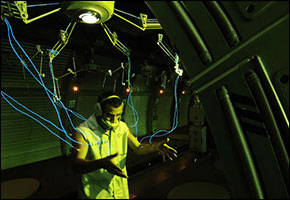
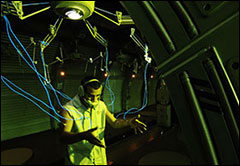
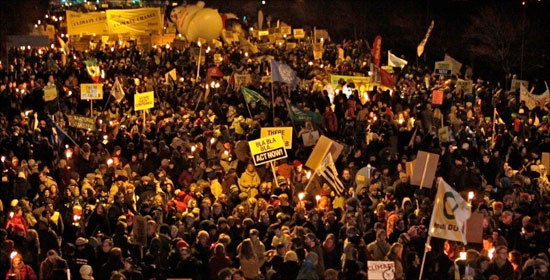
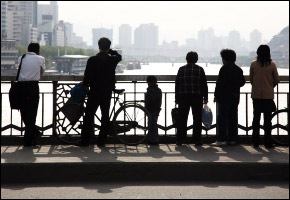
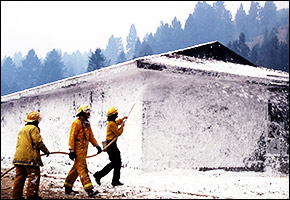
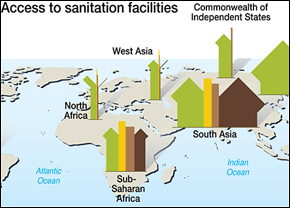

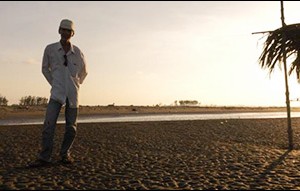
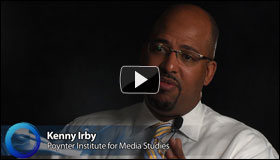
Leave a Reply
Want to join the discussion?Feel free to contribute!